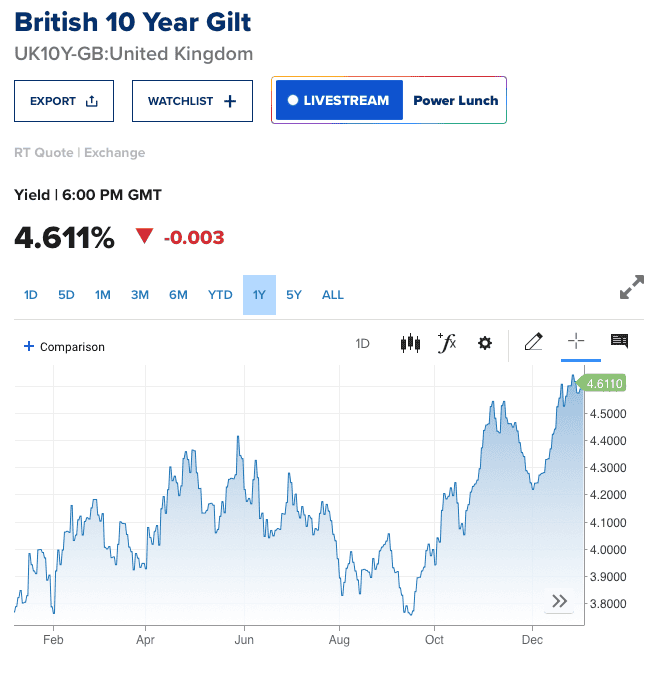Why is FTSE 100 stock Unilever tanking?


Over the last 12 months, Unilever (LSE: ULVR) shares have risen about 16%. However, this figure doesn’t tell the full story. Since 9 September they’ve actually fallen around 12%. So what’s going on with the blue-chip FTSE 100 stock right now? And is this a buying opportunity?
A bond proxy
In my view, the share price weakness can be largely attributed to interest rates. You see, Unilever’s often seen as a ‘bond proxy’. This is a type of stock that’s a bit like a bond in that it’s defensive in nature and it pays regular income.
Now when interest rates are falling, and yields on bonds are dropping, bond proxy stocks often do well. That’s because their dividends become more attractive to investors.
However, when rates are rising, or expected to stay higher for longer, bond proxies often underperform. That’s because many investors opt to invest in bonds instead (bonds are safer than stocks).
Now, if we look at the Unilever chart, it had a brilliant first three quarters of 2024, rising about 27%. Some of this performance was down to strong results, but for most of this period, investors were expecting major central banks such as the US Federal Reserve and the Bank of England to cut rates rapidly.
In the fourth quarter however, it started to become apparent that due to several variables (eg inflation and economic growth), interest rates may stay higher for longer. And government bond yields surged.
The yield on 10-year gilts, for example, jumped from 3.7% in mid-September to 4.6% at the end of the year. It was a similar story with US Treasuries with yields on 10-year Treasuries surging from 3.6% to 4.6%.
All of a sudden, investors could lock in relatively attractive bond yields for the long term. As a result, Unilever shares lost some of their appeal.

Worth buying?
Are the shares worth considering for an investment portfolio today? I think so.
Recently, the company’s been performing pretty well, thanks to a focus on efficiency by the new management team. And this year, the group’s expected to generate solid earnings growth.
Currently, earnings per share (EPS) for 2025 are expected to come in at 309 euro cents. That’s 6.3% higher than the forecast for 2024 (290 euro cents).
Meanwhile, the valuation has come down recently. We’re now looking at a price-to-earnings (P/E) ratio of less than 18, which I think is relatively attractive given this company’s brilliant long-term track record (annual returns of nearly 10% over the last decade).
As for the dividend yield, it’s risen to around 3.5% after the recent share price fall. That’s obviously not the highest out there but it’s decent, especially when you consider that Unilever tends to raise its payout by about 5% a year.
Of course, if interest rates move higher in the near term, I’d expect the stock to continue underperforming. Taking a long-term view however, I think the stock has the potential to generate solid returns when dividends are factored in.
The post Why is FTSE 100 stock Unilever tanking? appeared first on The Motley Fool UK.
Should you buy Unilever now?
Don’t make any big decisions yet.
Because Mark Rogers — The Motley Fool UK’s Director of Investing — has revealed 5 Shares for the Future of Energy.
And he believes they could bring spectacular returns over the next decade.
Since the war in Ukraine, nations everywhere are scrambling for energy independence,
he says. Meanwhile, they’re hellbent on achieving net zero emissions.
No guarantees, but history shows…
When such enormous changes hit a big industry, informed investors can potentially get rich.
So, with his new report, Mark’s aiming to put more investors in this enviable position.
Click the button below to find out how you can get your hands on the full report now, and as a thank you for your interest, we’ll send you one of the five picks — absolutely free!
More reading
- Looming recession? Here are 3 defensive FTSE 100 stocks to consider buying for 2025
- Here’s what I’m waiting for with the Unilever share price in 2025
- Here’s why 2025 could give investors a second chance at a once-in-a-decade passive income opportunity
- £3k in a savings account? It could be earning more passive income elsewhere
Edward Sheldon has positions in Unilever. The Motley Fool UK has recommended Unilever. Views expressed on the companies mentioned in this article are those of the writer and therefore may differ from the official recommendations we make in our subscription services such as Share Advisor, Hidden Winners and Pro. Here at The Motley Fool we believe that considering a diverse range of insights makes us better investors.





